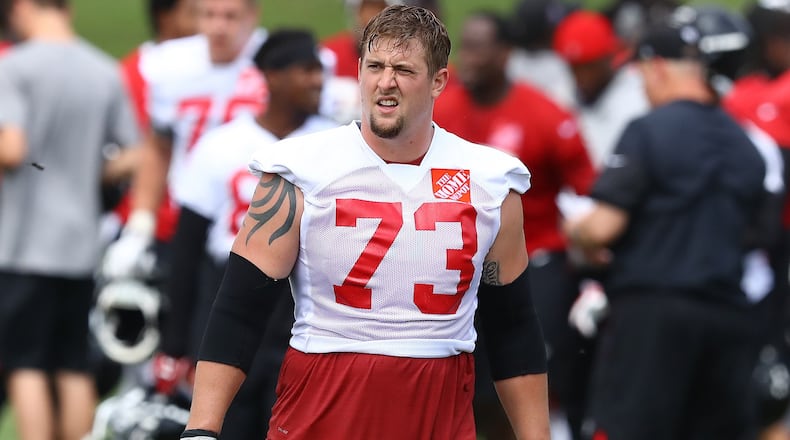Ryan Schraeder looks around at the cavalcade of new names and faces and numbers at minicamp and sees himself.
He sees himself in the dozens of players just trying to make the team. He sees himself in the rotation of guys fighting for the early nod in position battles, young and old. He sees himself in the slew of undrafted players.
Because, as NFL players go, Ryan Schraeder has been there and done that.
“I just tell them, ‘Do what I do and you’ll be a starter in this league,’ ” Schraeder said with a chuckle, shortly after wrapping up the Falcons’ first day of minicamp Tuesday.
His path to becoming one of the premier right tackles in football has been far from conventional.
Schraeder, now entrenched as the starting right tackle, didn’t step foot on a football field in high school. He walked on at Butler Community College in Kansas, then played for three years at Valdosta State, earning three consecutive all-American honors there.
And yet, Schraeder didn’t hear his name called in the 2013 NFL Draft. He signed with the Falcons as an undrafted free agent and got to work.
Fast forward five years, Schraeder, 30, now speaks in some of the platitudes that you might expect from a veteran tackle. He has now started 60 NFL games – and even earned himself a five-year, $31.5 million deal in 2016.
Far from proving his worth for a roster spot, Schraeder’s new task is giving back. He wants to become a leader on the offense.
“Every year there’s a new challenge,” Schraeder said. “This year, I’m trying to step up and be more vocal with the younger guys, and be able to explain stuff better. I’ve played a lot of football now at this point. I’ve actually got to start giving back to young guys and helping the team better overall.”
His offensive line coach, Chris Morgan, already has seen that progression begin to take place.
“It’s cool to see some of the guys that when we got here were were younger guys,” Morgan said. “Now you see them embracing that leadership role like Jake Matthews and Ryan Schraeder. Those were younger guys when we got here, now they are guys who are leading.”
But Schraeder brings an element that a guy like, Matthews, a former five-star recruit and top-10 pick in the NFL Draft, simply can’t.
If Schraeder sees an undrafted player trying to do too much, for example, he can empathize. If he notices a player with athletic limitations struggling to grasp the same skills, Schraeder can relate.
This, he said, is one of the many challenges that come with leadership, and one of the ways he thinks he can contribute to the greater good of the team.
“I’m different from other guys, other guys have different skills, bodies are different,” Schraeder said. “The hardest part is trying to explain something that maybe I do well that maybe another guy doesn’t understand. You’re trying to explain it to where he can figure it out, because a lot of it is, like, field and body awareness. That’s probably the hardest part is trying to translate what I do to one of these guys who’ve never done it before.”
For many players, minicamp is a time to go through the motions. It’s a chance to get the legs moving again, to jog the memory bank and get the football wheels turning, not to get bogged down in minutiae.
For others, it could the difference between a job and unemployment. It could determine whether a player gets an invitation to training camp. The minutiae means everything.
Ryan Schraeder understands both sides of the coin. Now he’s eager to take on the leadership role that comes with it.
“There’s undrafted guys out here that I think have got a chance to make the team,” Schraeder said. “It takes extra everything. If you get drafted, you get a few more chances to get it right. I know how hard it is – it’s not easy. I’ve been through the grind, it’s made me stronger.”
About the Author
Keep Reading
The Latest
Featured


